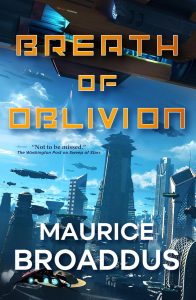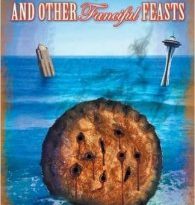Breath of Oblivion by Maurice Broaddus: Review by Nedine Moonsamy
 Breath of Oblivion, Maurice Broaddus (Tor 978-1-25026-512-8, $30.99, 400pp, hc) November 2024.
Breath of Oblivion, Maurice Broaddus (Tor 978-1-25026-512-8, $30.99, 400pp, hc) November 2024.
Breath of Oblivion is the second instalment in Maurice Broaddus’s highly anticipated Astra Black trilogy. The first book in the series, Sweep of Stars, was a Locus Award finalist in 2023 and garnered favourable reviews for his Afrofuturist space adventure. Sweep of Stars clearly displays Broaddus’s admirable worldbuilding, as he imagines the year 2121, long after the environmental collapse of Old Earth, where interplanetary resettlement has led to a much more expansive understanding of the universe. While humans have lost much in this process, the charm of the novel lies in its illustration of how Black culture endures to build community and to bring levity and hope into a troubled universe.
At the outset, we are introduced to the Muungano, a society that inhabits the Terran moon, stretches of the Mars colony, Titan, and Oyigiyigi. As a collective that consciously left Old Earth to build a new community, they seek to embody the principles of Muungano, which means “Togetherness” in Swahili, a far cry from the ruthless individualism of Old Earth values. Utopian society is wonderfully realised through Afrofuturist tropes, as the ethos of African philosophies and African American culture are embedded in the political functioning of Muungano life. The animist world that Broaddus invents is a harmonious synthesis of nature, technology, AI, and human coexistence. But their peace is soon disrupted by an unknown terrorist invasion that leads to the sudden and suspicious death of their beloved leader, Xola, and an artificial wormhole becomes a source of deep concern for the Muungano when some of their vessels are sucked into this void.
In Breath of Oblivion these fault lines turn into visible fractures as complex factions arise as a result of numerous power vacuums. Despite new leadership, the Muungano are still reeling from the loss of their former leader, Xola, and they are being antagonised by Old Earth, which is using this opportunity to force the Muungano into an interstellar alliance in order to bring them under Old Earth’s control. But when the Muungano send a delegation to Old Earth to calm these rising tensions, they are captured, and Wachiru, Xola’s son, is held in the Panopticon prison, where they intend to break his spirit. There is great civil unrest on Old Earth, and double agents abound. These events mirror the experiences of those in the wormhole. The Cypher, Muungano’s research vessel, has lost communication, and there is active dissent among the crew, as no one knows who should lead them back home. The Reapers, the military arm of the Muungano, are also compromised by numerous alien encounters. The vast amount of political manoeuvring that occurs in this book is philosophically interesting but slows down the pace substantially and is why Breath of Oblivion does not provide the same standalone satisfaction as Sweep of Stars.
Second books in trilogies struggle as the “in-between” narrative. Here, the new political relations that Broaddus introduces are clearly part of an attempt to broaden the canvas of his story for future events, but while we are engaged by newer concerns, the suspense generated in Sweep of Stars – what happened to Xola? Is there a cure for Bekele? – is offstage, presumably for these threads to be resolved only in the final instalment.
Both books excel at imagining the great cosmic expanse. Global Black culture emerges through the characters and Muungano culture, making the story a delicious blend of worlds that feel deeply familiar and new at the same time. I thoroughly enjoyed the way the novel engages with the historical consciousness of Black oppression as part of its interstellar explorations, as the colonial encounter is so inherent to mainstream science fiction that it often goes unnoticed.
In Broaddus’s work, the Muungano are deeply sensitive to systems of oppression and excavate ancestral knowledge to become better citizens of the galaxy. Yet what felt to me like a missed opportunity was that the book does not seem to fully engage with its own criticism of the Muungano. Often in Breath of Oblivion, other characters mention that they find the Muungano insufferably smug and self-righteous in their perfection. Broaddus favours a more romantic approach to the Muungano but, like all utopias, I found their unfaltering goodness becomes tedious and would have liked to see the critiques offered by characters explored to add more dimension to these beautifully crafted characters. Broaddus is good at generating a cliffhanger, and I, along with other Afrofuturist enthusiasts, am eager to read the final book in the trilogy.
Interested in this title? Your purchase through the links below brings us a small amount of affiliate income and helps us keep doing all the reviews you love to read!
Nedine grew up in Mosquito Valley, Lenasia and has lived in places as far flung as Helsinki, Poona and Makhanda since then. Currently, she lives and works in Pretoria, where she lectures on postcolonial literature in the English Department at the University of Pretoria. She also researches contemporary South African literature and science fiction in Africa. The Unfamous Five is her debut novel
This review and more like it in the December 2024 issue of Locus.
 While you are here, please take a moment to support Locus with a one-time or recurring donation. We rely on reader donations to keep the magazine and site going, and would like to keep the site paywall free, but WE NEED YOUR FINANCIAL SUPPORT to continue quality coverage of the science fiction and fantasy field.
While you are here, please take a moment to support Locus with a one-time or recurring donation. We rely on reader donations to keep the magazine and site going, and would like to keep the site paywall free, but WE NEED YOUR FINANCIAL SUPPORT to continue quality coverage of the science fiction and fantasy field.
©Locus Magazine. Copyrighted material may not be republished without permission of LSFF.









